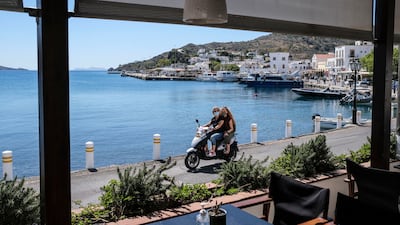Airlines have reported a rapid rise in bookings after UK ministers announced self-isolation requirements for fully vaccinated passengers arriving from amber list countries would be relaxed.
EasyJet said bookings to amber destinations - which includes most of Europe - rose by 400 per cent after Transport Secretary Grant Shapps said fully vaccinated travellers would not have to isolate when they return to the UK. The changes take effect on July 19.
British Airways said website traffic doubled after the announcement, the biggest change to Britain's travel rules in months.
The airline said the most searched for destinations included Spain and the US.
Booking website Skyscanner said there was a 53 per cent increase in website traffic on Thursday compared with the same time on Wednesday last week.
Holiday package company Thomas Cook identified Greece as the destination of choice for British sun-seekers.
“Searches for Greece have tripled in volume and will be the biggest winner from families booking last-minute summer holidays”, the company said.
“We have been selling very few holidays to amber countries and so with Greece, mainland Spain and Canaries all now available to people who’ve been double jabbed we’d expect a flood of bookings over the weekend.”
Bookings surge as Europe 'turns green'
Johan Lundgren, chief executive of easyJet, said: “Europe has now turned green for the double jabbed”.
"We have always said that vaccination is the key to unlocking travel and this means that millions will finally be able to reunite with family and loved ones abroad or take that long-awaited trip this summer", he said.
Heathrow Airport chief executive John Holland-Kaye welcomed the news but said "the job isn't done".
"This is excellent news that will give a much-needed boost to millions of people across Britain looking forward to a more normal summer and reuniting with family and friends abroad", he said.
“But the job isn’t done. To really kick-start the UK’s economic recovery, global Britain needs to get trading again. US business can get to the EU, but the UK remains cut off.
"The UK should open up travel to fully vaccinated people from more countries – particularly our key partners in the US – by the end of July."
At this stage, only UK residents who have received both injections from the National Health Service will be exempt from quarantine.
Transport Secretary Grant Shapps said there were complexities involved in recognising foreign vaccine certificates but he was hopeful they could be overcome soon.
"We’re actively working on this issue of how to accept vaccination from other countries", he told Sky News.
"Obviously we look at whether they are WHO-certified and the like, and in terms of a timescale I think in the next couple of weeks I’ll be able to come forward and say more about other locations in the world."
He also warned people should expect to wait longer in queues at airports as officials would now be required to check people's vaccination status, as well as passenger locator forms and negative test results.
“So the place to expect queues is the airport you are coming from. Once you get back to the UK all of that is starting to be automated”, he told the BBC.
“People should expect more disruption than usual but I know that everyone is working very hard to minimise those queues.”
Expect queues, travellers told
Lucy Moreton, from the ISU union representing border workers, warned staff shortages would create further problems in the UK.
“It’s a political decision to check 100 per cent of Covid arrivals and that largely is the problem here”, she said.
“There still will be queues associated with EU exit, with staff perhaps not being as available, particularly if self-isolation figures surge in the way people are suggesting they might.
“But whilst we retain the requirement to check four pieces of documentation for every arriving passenger – the e-gate cannot check the pre-departure test certificate because they’re not uniform, and they can’t at the moment check any vaccination status, if that becomes relevant – so whilst that remains the political imperative these queues are going to happen.”
Currently, anyone entering from an amber list country must enter 10-day self-isolation. Those arriving from a red list country must pay to quarantine at government-approved hotels. Green list passengers are not required to isolate regardless of vaccination status.
The traffic light system applies to England, with Scotland, Wales and Northern Ireland able to make their own rules. However, the rules are broadly the same and previous changes to the lists have been adopted by all four nations.
Countries are rated according to the level of coronavirus risk, with factors including testing capacity, variant detection, data quality and level of vaccination all taken into account.
As part of the changes to take place on July 19, the government will remove advice warning people against travelling to amber list countries, effectively turning those destinations green for fully vaccinated passengers.
Amber and green passengers are still required to take a Covid test two days after arriving in England.
Prices remain steady
Consumer advocate Which? said it had yet to see a widespread increase in prices to popular holiday destinations after Thursday's announcement.
Out of 14 package holiday prices and six flights to Greece, Italy, Spain and Portugal it tracked departing during the peak holiday season in August, 12 packages remained the same price and only two increased.
"Repeated checks by Which? have found flight and holiday prices do not rise because the government has eased restrictions on international travel, as demand remains relatively low and airlines are able to add more capacity to routes," Which?'s travel editor Rory Boland said.

